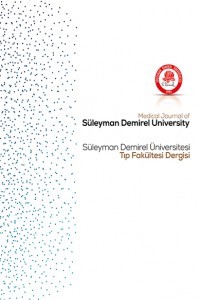Non-syndromic recessive hearing loss Linkaged TMPRSS3 gene in the Turkish population
Resesif iþitme kaybý, TMPRSS3 geni
___
- Petit, C. Genes responsible for human hereditary deafness: Symphony of a thousand. Nat Genet 1996; 14, 385-391.
- Sundstrom RA, Laer LV, Camp GV, Smith RJH. Autosomal recessive nonsyndromic hearing loss. Am J Med Genet 1999; 89, 123-129.
- Willems PJ. Genetic causes of hearing loss. The New England Journal o Medicine 2000; 342, 1101-1128.
- Baldwin CT, Weiss S, Farrer LA, Stefano AL, Adair R, Franklyn B, et al. Linkage of congenital, recessive deafness (DFNB4) to chromosome 7q31 and evidence of genetic heterogeneity in the Middle Eastern Druze population. Hum Mol Genet 1995; 4, 1637-1642.
- Petit C, Levilliers J, Hardelin J. Molecular genetics of hearing loss. Annu Rev Genet 2001; 35, 589-646.
- Van Camp G, Smith R. Antwerp Hereditary Hearing Loss Homepage. http://dnalabwww. uia.ac.be/dnalab/hhh.
- Veske A, Oehlmann R, Younus F, Mohyuddin A, Muller-Myhsok B, Mehdi SQ, et. al. Autosomal recessive nonsyndromic deafness locus (DFNB8) maps on chromosome 21q22 in a large consanguineous kindred from Pakistan. Hum Mol Genet 1996; 5, 165- 168.
- Bonne-Tamir B, DeStefano A, Briggs CE, Adair R, Franklyn B, Weiss S, et al. Linkage of congenital recessive deafness (gene DFNB10) to chromosome21q22.3. Am J Hum Genet 1996; 58, 1254-1259.
- Ben-Yosef T, Wattenhofer M, Riazuddin S, Ahmed ZM, Scott HS, Kudaoh J, et al. Novel mutations of TMPRSS3 in four DFNB8/B10 families segregating congenital autosomal recessive deafness. J Med Genet 2001; 38, 396-400.
- Wattenhofer M, Iorio MVD, Rabionet R, Dougherty L, Pampanos A, Schwede T, et al. Mutations in the TMPRSS3 gene are rare cause of childhood nonsyndromic deafness in Caucasian patients. J Mol Med 2002; 80, 124-131.
- Grimberg J, Nawoschick S, Belluscio L, McKee R, Turck A, Eisenberg A. A simple and efficient non- organic procedure for isolation of genomic DNA from blood. Nucleic Acids Res 1989; 17, 8390.
- Tekin M, Akar N, Cin S, Blanton SH, Xia XJ, Liu XZ, et al. Connexin 26 (GJB2) mutations in the Turkish population: implications for the origin and high frequency of the 35delG mutation in Caucasians. Hum Genet, May 2001; 108(5), 385-389.
- Baris I, Kilinc MO, Tolun A. Frequency of the 35delG mutation in the connexin26 gene in Turkish hearing- impaired patients. Clin Genet 2001; 60(6), 452-455.
- Dracopoli NC, Haines JL, Korf BR, Moir DT, Morton CC, Seidman CE, et al. Current Protocols In Human Genetics 1995; Volume 1, John Wiley & Sons, Inc.
- ISSN: 1300-7416
- Yayın Aralığı: Yılda 4 Sayı
- Başlangıç: 2015
- Yayıncı: Süleyman Demirel Üniversitesi
Gürkan ACAR, Selahaddin AKÇAY, Süleyman ASLAN, Mert KÖROĞLU, Orhan OYAR
Ortodontik tedavi amacıyla başvuran bir hasta populasyonunun incelenmesi
M.özgür SAYIN, Hakan TÜRKKAHRAMAN, A.onur ATİLLA
Isparta- Burdur bölgesinde diş hekimi- hasta ilişkilerinin etik yönü
Ayşe Keçeci, Bulem Üreyen Kaya, Hamide Bozkuş
Ratlarda kadmiyumun pankreasa etkileri
Osman GÖKALP, Mehmet ÖZER, Ahmet KOYU, Ekrem ÇİÇEK, Recep SÜTÇÜ, Ahmet KOÇAK, Sebahat ÖZDEM, Onur AKTÜRK
Akciğer kanseri tanısı alan olgularımızın Retrospektif değerlendirilmesi
H.Ahmet Bircan, Önder Öztürk, Ünal Şahin, Nurcan Özaydın, Ahmet Akkaya
Yaşlanma sürecinde melatoninin rolü
Hakan MOLLAOĞLU, M.fehmi ÖZGÜNER
Teşhis mi şans mı? Panoramik radyografda iki genç kadın hastanın osteoporoz teşhisi (olgu raporu)
H.hüseyin YILMAZ, M.numan TAMER, Mustafa YILDIZ, Ülkem AYDIN, Derya YILDIRIM
Isparta bölgesi kan donörlerinde hbsag ve anti-hcv seroprevalansı
Selçuk Kaya, Buket CİCİOĞLU ARIDOĞAN, Ali K. ADİLOĞLU, Mustafa Demirci
Günümüzden geleceğe nükleer kardiyoloji
Zühal AY, Erdal EROĞLU, Suha TÜRKASLAN, F.yeşim BOZKURT, H.ramazan YILMAZ
